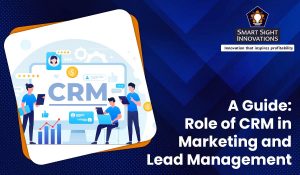 What Is a CRM?
What Is a CRM?
CRM stands for customer relationship management. As the name suggests, CRM is a software that helps you manage customer relationships. It is an approach or procedure you develop to establish, maintain or manage client connections, usually involving CRM software development. The following can be optimized with a CRM:
- Sales
- Marketing
- Customer service
- Accounting and management
A customer can access your CRM in several ways, including filling out a form, making a phone call or by using a live chat feature.
What Is CRM Software?
CRM software is a technology that allows companies to organize, manage and collect client data. The purpose of a CRM is to help organizations effectively administer their customer relations, which will lead to greater success. The software tracks and manages incoming leads efficiently. In a CRM, you can find data regarding your current clients and their purchasing patterns, emails sent to potential and established clients, etc.
Role of CRM in Marketing
Generating leads, prospects and customers for the business is crucial for any enterprise. Customer relationship marketing does just that. The businesses have all the resources and data necessary to operate marketing campaigns more efficiently and profitably. Many customer relationship management in marketing have mobile apps that help you easily access client data on the go. Some of the best marketing CRM software available are:
- Monday.com
- Keap
- Hubspot CRM
- Zendesk Connect
- Creatio
- Act!
- SugarCRM
- Nutshell
There are also some CRM’s that offer email marketing software tools like:
- Mailchimp
- Autopilot
- GoSquared
- Marketo
- ActiveCampaign
A CRM’s functions in marketing can be divided into:
1. Managing inbound leads
Businesses generate new inbound leads through marketing channels, campaigns and advertising. This could be done through a live chat session, phone call or eBook and your CRM acts as the core for generating leads.
2. Marketing based on data
A CRM can assist you in determining what is producing new leads and helps you understand what the requirements of your leads are. It is a great approach to decide which part of your client’s journey is effective.
3. Tracking client’s purchasing history
As a first step, you need a CRM to track the purchasing history of your client. You may not see the entire history, but the CRM will definitely provide you an insight into what customers are looking for and how your marketing is performing.
4. Identifying chances for fresh content
Customer’s search habits help you find fresh content opportunities. You can utilize your CRM to compile all of their responses and use them to find new content opportunities.
The CRM that has the features you require to fulfill your business marketing demands, that your marketing team can utilize without requiring considerable training and that handles marketing tasks without the need for human action (Marketing Automation) are considered the best.
Role of CRM in Lead Management
Lead management is the movement of a sales lead or prospect from one level of your sales pipeline to the next. It is the ability to convert prospective customers into actual ones. It also involves maintaining a balance between seeking out new clients, staying in touch with existing leads and ensuring that none of your leads are lost.
Let’s suppose that your business receives an influx of new leads because of a recent positive media attention. You will now need to balance the prospects by qualifying, scoring and nurturing various fresh leads while still taking care of the prospects you were previously nurturing. Without an efficient lead management strategy, you may overlook or completely miss out on potential new clients. If you miss the new prospects, it could lead to a loss in potential.
With a CRM software, you are more likely to track all significant leads, advance them through the sales pipeline and finally close deals. It is important to remember that not all potential leads are worth pursuing. The CRM software makes it easy to utilize the advantages of lead management, such as:
- The CRM for lead management is essential in accurately screening and rating your leads. Without this software, you will be unable to display the results and this affects your sales strategy as your team is unable to prioritize the leads.
- The CRM software helps you access all information about a lead on a single screen. This feature is helpful in maintaining paper records or creating different documents for each sales lead.
- CRM for lead management helps in effectively storing the data and generating reports quickly based on these insights.
- When a prospect fills the lead capture form, you sometimes get only the basic information like name, company, etc. CRM’s can automatically fill in the gaps by finding and storing the data by scanning other websites that the lead accesses.
- CRM’s can track all the interactions of the lead with your company using social media, website back-end data, email marketing tools, etc. This inturn helps in understanding the needs and wants of your prospect.
CRM software system helps in each phase of lead management by enabling you to set specific criteria, automate some steps, keep track of lead data and simplify the process for you and the customers.











